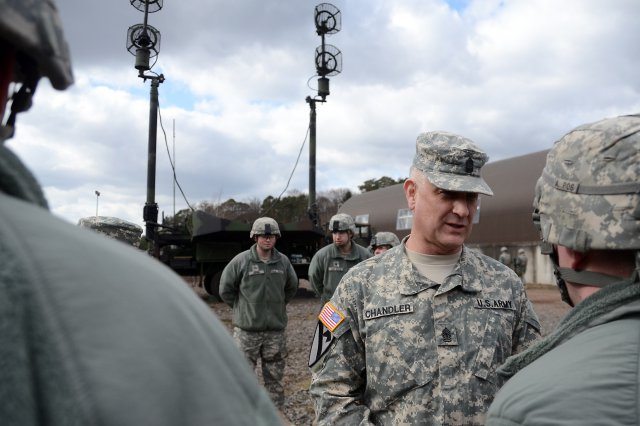Senior enlisted leaders from each service denounced hazing in the armed forces yesterday and delivered a message of unity while testifying before a congressional panel.
The most recent known incident of hazing came when the Army brought charges against eight Soldiers allegedly involved in the death of Army Pvt. Danny Chen who was found dead of an apparent self-inflicted gunshot wound in a guard tower in southern Afghanistan on Oct. 3.
Sgt. Maj. of the Army Raymond Chandler emphasized professionalism and the importance of keep the nation’s faith while speaking to the House Armed Services Committee’s military personnel subcommittee.
“My overall message to the force is the Army profession,” he said. “I talk about what it means to be a professional, how Soldiers should conduct themselves, and more importantly, how they should treat each other.”
To be professional, Chandler said, Soldiers must possess the three C’s — competence, commitment and character. “A Soldier who is committed to the Army has character, and lives the Army values at all times, even in the absence of peers or leadership.”
“We have a duty as professional Soldiers to maintain the trust and confidence of the American people,” he said. “Not just to fight and win our nation’s wars, but also to maintain high professional and ethical standards.”
Rick West, master chief petty officer of the Navy, told the committee people are “absolutely our most precious asset.”
“Their individual success and the Navy’s collective mission accomplishment lie in our ability to provide an environment that promotes inclusiveness and a validated sense of value to the team,” he said.
“Hazing unequivocally destroys these ideas and is not tolerated in your Navy,” West said. “It is inconsistent to our core values of honor, courage and commitment, and detrimental to individual esteem and unit cohesion.”
West said the Navy will hold those responsible for hazing liable and “those in leadership positions who tolerate such acts, [because] we understand people are truly the singular measure of the Navy’s success.”
Michael P. Barrett, sergeant major of the Marine Corps, emphatically stated “hazing is not a part of our service culture or who we are.”
“Hazing fosters a climate of maltreatment and cruelty — concepts inconsistent with our core values,” he said. “As an institution, the only way that the Marine Corps can exist, survive and thrive is through fostering a climate where Marines have every opportunity for participation and advancement in accordance with their talents, backgrounds, culture and skills.”
Barrett noted that Marine Corps recruits are the youngest of service members, with 63 percent of the force under the age of 25.
“The Marine Corps aims to transform our nation’s youth, not only into ethical warfighters, but into better quality citizens,” he said. “As we do so, we expect to confront matters of hazing, arising sometimes from the indiscretions of youth.”
James Roy, command master sergeant of the Air Force, noted his service doesn’t have a service-specific policy on hazing, but has adopted the Defense Department’s guidance.
“This allows us to impart on our airmen that hazing will not be tolerated and serves as a foundation for the culture and respect and dignity we build throughout an entire career,” he said.
“Airmen are exposed to human relation training early and often starting with recruitment, basic training [and] continuing through separation and retirement,” Roy said. “This training makes it clear that activities like hazing will not be tolerated.”
The Coast Guard’s senior enlisted member, Master Chief Petty Officer of the Coast Guard Michael P. Leavitt, encouraged leadership engagement.
“Hazing typically occurs in connection with unofficial, unsupervised initiations or other informal rites of passage and are not authorized in the Coast Guard or unit policy,” he said.
“Prevention of hazing can best be achieved through training and strong leadership that is engaged and involved at all levels,” Leavitt said. “This will help ensure the culture across the Coast Guard is intolerant of hazing.”
Leavitt said his service places the highest priority on preventing hazing.
“We have a strong and clear policy, extensive training, effective leadership and an environment within the Coast Guard to ensure our members are treated with dignity and respect,” he said.
“It is essential to eradicate hazing so all Coast Guard members may fully contribute to mission success,” Leavitt said. “The people of our great nation deserve nothing less from us.”










